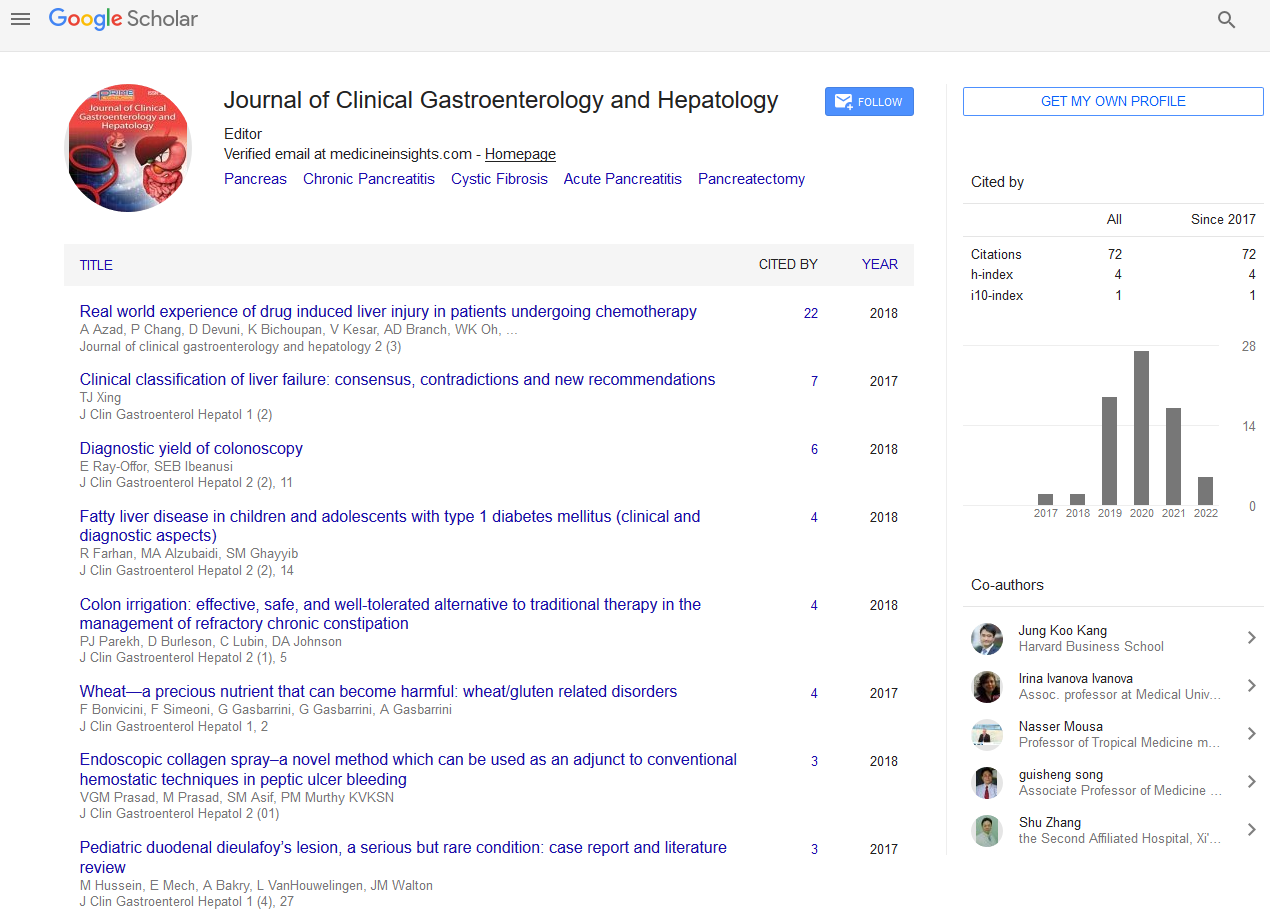Perspective - (2023) Volume 7, Issue 1
Causes Complications and Treatment of Zollinger-Ellison Syndrome
Justin Roy*
Department of Gastroenterology and Hepatology, University of Alabama, United States
*Correspondence:
Justin Roy,
Department of Gastroenterology and Hepatology, University of Alabama,
United States,
Email:
Received: 30-Jan-2023, Manuscript No. IPJCGH-23-16034;
Editor assigned: 01-Feb-2023, Pre QC No. IPJCGH-23-16034 (PQ);
Reviewed: 15-Feb-2023, QC No. IPJCGH-23-16034;
Revised: 20-Feb-2023, Manuscript No. IPJCGH-23-16034 (R);
Published:
27-Feb-2023, DOI: 10.36648/2575-7733.7.1.9
Introduction
The uncommon condition Zollinger-Ellison syndrome causes
one or more tumours to develop in the pancreas or the upper
portion of the small intestine. The tumours are known as
gastrinomas. The chemical gastrin is abundantly produced by
these gastrinomas. When the stomach produces too much acid
as a result of Gastrin, peptic ulcers develop. Moreover, symptoms
such as diarrhoea and abdominal pain might be brought
on by excessive gastrin levels. Every time could be a potential
Zollinger-Ellison syndrome episode. However between the ages
of 20 and 60, the majority of people become aware of their condition.
The most popular kind of treatment entails taking medications
to lower stomach acid and treat ulcers. Some patients
may also require surgery for tumour removal.
Description
The precise cause of Zollinger-Ellison syndrome is uncertain.
The course of events is the same in the majority of Zollinger-Ellison
syndrome cases, though. The syndrome starts when one
or more tumours develop in your pancreas or the duodenum,
a section of your small intestine. your stomach’s portion that
connects to your duodenum. The lymph nodes close to your
pancreas, for instance, may occasionally be the location where
the tumours develop. Your pancreas is behind and beneath
your stomach. It generates the enzymes required for proper
meal digestion. The pancreas produces a variety of hormones,
insulin being only one of them. Insulin is the term for the hormone,
sometimes known as glucose, that aids in blood sugar
regulation.
The digestive secretions from the pancreas, liver, and gallbladder
combine in the duodenum. A significant chunk of your
processing takes place here. The tumours associated with
Zollinger-Ellison syndrome are made up of cells that secrete a lot of the hormone gastrin. They are hence occasionally referred
to as gastrinomas. Due to excessive gastrin, the stomach
secretes far too much acid. Following that, peptic ulcers and occasionally
diarrhoea are brought on by the extra acid.
Cancerous tumours are common, and they also cause an excessive
amount of acid production. The cancer can spread to other
parts of your body, most frequently to your liver or nearby
lymph nodes, even though tumours typically grow slowly. Various
endocrine neoplasia, type 1 is an acquired condition that
has been linked to Zollinger-Ellison disorder (MEN 1). Patients
with MEN 1 also have parathyroid tumours. They might also
have tumours of the pituitary gland.
About 25% of individuals with gastrinomas are MEN 1 members.
They might also have pancreatic or organ tumours. Zollinger-Ellison
syndrome does not always have symptoms. Some of the
symptoms include abdominal discomfort, scorching pain in the
belly, nausea, diarrhoea, weight loss, vomiting, stomach bleeding,
weakness, and weariness.
Conclusion
Reduced generation of stomach acid is the cure for ZES. Proton
pump inhibitors are usually recommended drugs. The production
of stomach acid is decreased by these drugs, which include
dexlansoprazole (Dexilant), esomeprazole (Nexium), lansoprazole
(Prevacid), omeprazole (Prilosec, Zegerid), pantoprazole
(Protonix), and rabeprazole (Aciphex), which also aids in the
healing of ulcers. The treatment for ZES depends on whether
the gastrinoma is spontaneous or a result of inherited MEN I
disease. Sporadic gastrinomas are normally treated with acid
suppression alone, but the latter are typically treated with surgical
removal of the tumour. Octreotide, a somatostatin analogue
that blocks the production of hormones, is also highly
good at managing symptoms.
Citation: Roy J (2023) Causes Complications and Treatment of Zollinger-Ellison Syndrome. J Clin Gastroenterol Hepatol. 7:09.
Copyright: © 2023 Roy J. This is an open-access article distributed under the terms of the Creative Commons Attribution License, which permits unrestricted use, distribution, and reproduction in any medium, provided the original author and source are credited.

